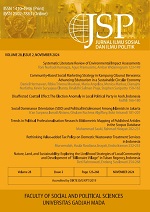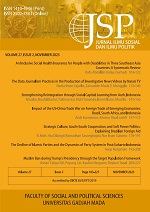Women and Coffee Farming: Collective Consciousness towards Social Entrepreneurship in Ulubelu, Lampung
Dian Karinawati Imron(1*), Al Rosyid Anggi Satrya(2)
(1) Community Development Officer PT Pertamina Geothermal Energy Area Ulubelu
(2) Community Development Officer PT Pertamina Geothermal Energy Area Ulubelu
(*) Corresponding Author
Abstract
Women and coffee farming raise close attention in agriculture and development debates. History shows that women profoundly contribute to producing good quality coffee. However, their involvement has not fully brought positive development for themselves and their families. As a major coffee producer, women in Ulubelu, Lampung experience that condition. Women face market uncertainty, lack access to knowledge, lack power to make decisions, face unsupportive policies, and experience low participation in organizations to gain capacity building on coffee value chain. Although women deal with the difficult situation, there are some figures that encourage collective reflection of women to address the coffee farming problem. This paper attempts to assess women’s consciousness of coffee farming and how they develop kinds of action through social entrepreneurship to tackle the coffee farming issues. The research used descriptive analysis with a case study approach. The study found various reflections as a sign of women’s consciousness to engage in coffee farming and value chain. There are: a) coffee as a source of farming livelihood, b) coffee as cooperative entrepreneurship, and c) coffee as a sustainability ideal. The consciousness drives women to act and makes positive change. Furthermore, there are diverse actors engaged; for instance, NGO (Non-Government Organization), states and private. Although there are many actors involved, the certain quality assistance needs to be improved.
Keywords
Full Text:
PDFReferences
Akter, S., Rutsaert, P., Luis, J., Htwe, N. M., San, S. S., Raharjo, B., Pustika, A. (2017). Women’s empowerment and gender equity in agriculture: A different perspective from southeast asia. Food Policy, 69, 270–279.
Anwar, M. Z. (2013). Organisasi perempuan dan pembangunan kesejahteraan. Sosiologi Reflektif, 8(1), 133-146.
Arifin, B. (2014). Global sustainability regulation and coffee supply chains in Lampung Province, Indonesia. Asian Journal of Agriculture and Development, 7(2), 67-89.
Austin, J., Stevenson, H., & Wei-Skillern, J. (2006). Social and Commercial Entrepreneurship: Same, Different, or Both? Entrepreneurship: Theory & Practice, 30(1): 1-22.
Badan Pusat Statistik Tanggamus. (2015). Tanggamus Dalam Angka 2015. Bandar Lampung, Indonesia: BPS.
Birchall, Johnston. (2011). A ‘Member-Owned Business’ Approach to the Classification of Co-operatives and Mutuals. Journal of Co-operative Studies, 44(2),4-15
Bourgeois, R. (2014). Farmers moving out of poverty: what are the challenge?. Paper presented at the Indonesian-French Seminar on Social Sciences and Humanities. Retrieved from https://www.researchgate.net/publication/282643784_Farmers_moving_out_of_poverty_what_are_the_challenges
Cornwall, A. (2016). Women's empowerment: What works?. Journal of International Development, 28, 342–359. doi: 10.1002/jid
Creswell, J. W. (2003). Research design: Qualitative, quantitative, and method approached. California: Sage Publication, Inc
Dees, G., Emerson, J., & Economy, P. (Eds.). (2001). Enterprising Nonprofits: A toolkit for Social Entrepreneurs. New York: John Wiley & Sons.
Direktorat Jenderal Perkebunan. (2016). Statistik perkebunan indonesia 2015-2017. Jakarta, Indonesia: Sekertariat Direktorat Jenderal Perkebunan.
Erry, H., Abdullah, I., Udasmoro , W. (2013). Konstruksi media terhadap perempuan terlibat kasus dalam tayangan televisi. Jurnal Pemikiran Sosiologi, 2(2), 11-12.
Elgin, D. (1997). Collective consciousness and cultural healing. USA: Millennium Project
Fischer, E. & Qaim, M. (2012). Gender, agricultural commercialization, and collective action in kenya. Food Security, 4(3), 441-453. Retrieved from https://link.springer.com/article/10.1007/s12571-012-0199-7
Food and Agriculture Organization of the United Nations. (2013). gender equality and food security: Women’s empowerment as a tool against hunger. Philippines: Asian Development Bank.
Gatzweiler, F. W., von B. & Joachim. (2016). Technological and institutional innovations for marginalized smallholders in agricultural development. Bonn: Springer.
Gumulya, D. & Helmi, S. I. (2017). Kajian budaya minum kopi. Dimensi, 13(2), 153-172.
Henley, D., & Nordholt, H. S. (2015). Environment, trade and society in Southeast Asia. Leiden: Koninklijke Brill Nv.
Hudiyato, R. (2015). Kopi dan gula: Perkebunan di kawasan regentschap malang, 1832-1942. Sejarah dan Budaya, 9(1), 96-113.
International Coffee Organization. (2018). Total production by all exporting countries. Retrieved from http://www.ico.org/prices/po-production.pdf
Kaaria, S., Osorio, M., Wagner, S. & Gallina, A. (2016). Rural women’s participation in producer organizations: An analysis of the barriers that women face and strategies to foster equitable and effective participation. Journal of Gender, Agriculture and Food Security, 1(2), 148-167.
Kumagai, A., & Lypson, M. L. (2009). Beyond cultural competence: Critical consciousness, social justice, and multicultural education. Academic Medicine, 84(6), 782-787.
Leimona, B., Amanah, S., Pasha, R., Wijaya C. I. (2013). Gender dalam skema imbal jasa lingkungan. studi kasus di singkarak, sumberjaya, dan sesaot. Bogor, Indonesia: World Agroforestry Centre (ICRAF) Southeast Asia Regional Program.
Madeley, J. (2010). Women marginal farmers-mobilising for change. London: FSC.
Manzo, J. (2015). “Third-Wave” Coffeehouses as Venues for Sociality: On Encounters between Employees and Customers. The Qualitative Report, 20(6), 746-761. Retrieved from http://nsuworks.nova.edu/tqr/vol20/iss6/2
McArdle, L., & Thomas, P. (2012). Fair enough? Women and fair trade. Critical Perspectives on International Business, 8(4), 277-294. doi: 1108/17422041211274165
McDonnell, D., Macknight, E., & Donnelly, H. (2012). Co-operative entrepreneurship: co-operate for growth. Retrieved from http://aura.abdn.ac.uk/bitstream/handle/2164/7699/Co_operative_Entrepreneurship_Co_operate_for_growth.pdf;jsessionid=E116B2DFF0CFFAECE47C15BC586CBF31?sequence=1
Naletova, I. V., Okatov, Alexander V., Zhulikofa, Olga V. (2016). Classical concepts of social solidarity as the basis of theoretical studies on the institutions of modern civil society. International Journal of Environmental & Science Education, 11(18), 11529-11540.
Nguyen, G. N., & Sarker, T. (2018). Sustainable coffee supply chain management: A case study in buon me thuot City, Daklak, Vietnam. International Journal of Corporate Social Responsibility, 3(1), 1-17.
Ochago, R. (2017). Barriers to women’s participation in coffee pest management learning groups in Mt Elgon Region, Uganda. Cogent Food & Agriculture, 3(1), 1-19. doi: 10.1080/23311932.2017.1358338
Oxfam. (2013). Women's Collective Action: Unlocking the potential of agricultural markets, an oxfam international research report. UK: Oxfam International
Perdana, A., & Roshetko, J. M. (2012). Agroforestry and forestry in sulawesi series: Rapid market appraisal of agricultural, plantation and forestry commodities in south and southeast Sulawesi. (ICRAF Working Paper No. 160). Retrieved from http://www.worldagroforestry.org/downloads/Publications/PDFS/WP12059.pdf
Resurrection, B. P., & Elmhirst, Rebecca. (2008). Gender and natural resource management: livelihoods, mobility and interventions. New York: Earthscan.
Rogers, E. M. (1995): Diffusion of innovations (4th ed.). New York: The Free Press.
Roshetko, N. A. (2015). Smallholders’ coffee production and marketing in indonesia:a case study of two villages in south sulawesi province. (ICRAF Working Paper No. 205). Retrieved from http://www.worldagroforestry.org/downloads/Publications/PDFS/WP15690.pdf
Samper, Luis F., Giovanucci, Daniele., Vieira, Luciana M. (2017). The powerful role of intangibles in the coffee value chain. Economic Research Working Paper No. 39. Retrieved from https://www.wipo.int/edocs/pubdocs/en/wipo_pub_econstat_wp_39.pdf
Senders, A., Motz, M., Lentink, A., Vanderschaeghe, M., & Terrillon, J. (2014). Sustainable coffee as family business. Goudriaan: Hivos.
Schroeder, C., Zeller, M., & Noameshie, A. R. A. (2013). Women, social capital and collective action – the case of nerica rice technology in benin. Quarterly Journal of International Agriculture, 52(4), 329-356.
Soetomo. (2013). Pemberdayaan masyarakat: mungkinkah muncul antitesisnya?. Yogyakarta: Pustaka Pelajar.
Tan, Wee-Liang., Williams, John., Tan, Teck-Meng. (2005). Defining the ‘Social’ in ‘Social Entrepreneurship’: Altruism and Entrepreneurship. International Entrepreneurship and Management Journal, 1, 353–365
Towaha, J., Aunillah, A., Purwanto, E. H.., Supriadi, H. (2014). Pengaruh elevasi dan pengolahan terhadap kandungan kimia dan citarasa kopi robusta lampung. Jurnal Tanaman Industri dan Penyegar, 1(1), 57-62. Retrieved from http://ejurnal.litbang.pertanian.go.id/index.php/bultri/article/view/2326/2018
Yunus, M. (2008). Creating a world without poverty: Social business and the future of capitalism. Global Urban Development, 4(2), 1-18.
Zuhraini. (2017). Perempuan dan hukum dalam masyarakat hukum adat lampung sebatin. Ijtimaiyya: Jurnal Pengembangan Masyarakat Islam, 10(2), 197-215.
Article Metrics
Refbacks
- There are currently no refbacks.
Copyright (c) 2019 Jurnal Ilmu Sosial dan Ilmu Politik

This work is licensed under a Creative Commons Attribution-NonCommercial-NoDerivatives 4.0 International License.























